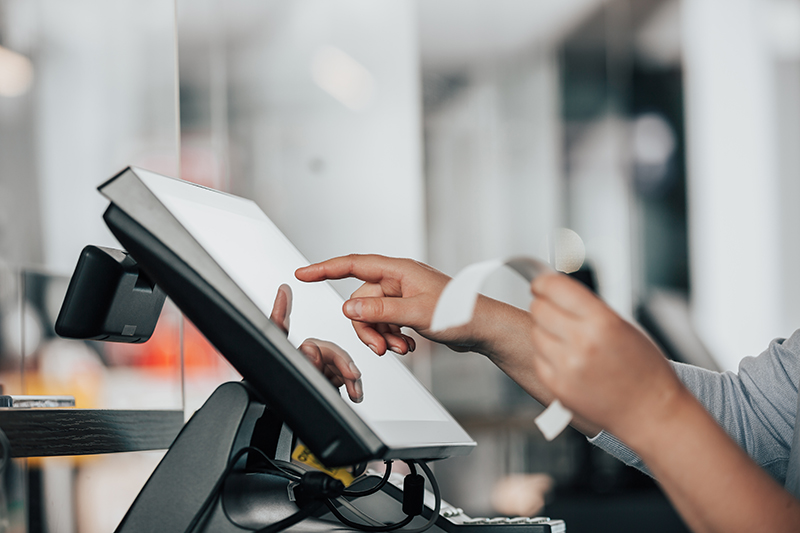Mobile point of sale (mPOS) systems extend far beyond the confines of a retail store, significantly impacting e-commerce and how people shop on their mobile phones. Customers can make purchases, track orders, and engage with brands directly from their smartphones, enhancing convenience and accessibility. By leveraging mobile POS systems, businesses can offer a consistent and efficient shopping experience across various channels, catering to the modern consumer’s preference for mobile shopping.
 Mobile POS is the most efficient for garden centers, market vendors, and pop-up shops. However, with the growing trends in retail, more stores are relying on a mobile-first strategy. Bring the check-out to your customers and minimize lines. Enhancing this customer experience increases the probability of returning customers.
Mobile POS is the most efficient for garden centers, market vendors, and pop-up shops. However, with the growing trends in retail, more stores are relying on a mobile-first strategy. Bring the check-out to your customers and minimize lines. Enhancing this customer experience increases the probability of returning customers.
61% of retailers see high value in using mobile devices to alert employees of buy online/pick up in store (BOPIS)-related tasks. – RSR Research
Understanding Mobile POS (mPOS)
Transitioning from traditional POS terminals to mobile POS (mPOS) is straightforward. Traditional POS systems typically involve a touchscreen monitor linked to a cash register and a card reader. In comparison, mPOS represents a modern, electronic evolution of this setup. It leverages a Wi-Fi connection to contact your Counterpoint database and process transactions.
Mobile POS trends and its’ growing popularity
As businesses increasingly seek ways to enhance customer experiences and streamline operations, mPOS solutions have become preferred. Their growing popularity is fueled by the demand for more flexible, on-the-go transaction options that traditional POS systems can’t easily match.
Consumers love mPOS because it reduces wait times and provides a more seamless shopping experience. It allows for quick payments right at the point of interaction. This convenience and the ability to receive personalized service and immediate assistance make mPOS a favorite among shoppers.
Additionally, retailers benefit from real-time inventory management and sales tracking, making mPOS an indispensable tool for modern retail environments. The trend towards mobile POS reflects a broader shift towards more agile, customer-centric retail practices.
mPOS VS. Traditional POS, which is better?
A mobile pos system may not be the solution for every retailer. Let’s take a closer look at what sets these two apart…
- Mobility
It’s in the name. mPOS systems are designed for mobility, typically using tablets or smartphones. This allows sales associates to move freely around the store or even conduct transactions at customer events, whereas traditional POS systems are stationary with fixed terminals. - Connectivity
mPOS operates over Wi-Fi, requiring only an internet connection to function. Traditional POS systems sometimes rely on local servers and can be less dependent on internet connectivity. - Cost
mPOS systems generally have lower upfront costs and can be bundled with other mobile devices. Traditional POS systems involve higher initial investments in hardware and may require more extensive setup and maintenance. - User Experience
mPOS systems offer a more streamlined and user-friendly interface, often leveraging touch screens and intuitive apps. Traditional POS systems may involve more complex, multi-component setups with physical keyboards and cash drawers.
 Mobile POS systems offer the functionality of traditional POS setups but at a lower cost and with more efficient maintenance, all while adapting seamlessly to evolving customer needs. Despite the growing popularity of mPOS, traditional POS systems remain valuable in specific retail environments. Their robust and reliable infrastructure makes them ideal for high-volume or specialized settings that require a fixed, comprehensive solution. While modern mPOS systems provide flexibility and portability, traditional POS systems continue to excel in scenarios where stability and a well-established setup are essential.
Mobile POS systems offer the functionality of traditional POS setups but at a lower cost and with more efficient maintenance, all while adapting seamlessly to evolving customer needs. Despite the growing popularity of mPOS, traditional POS systems remain valuable in specific retail environments. Their robust and reliable infrastructure makes them ideal for high-volume or specialized settings that require a fixed, comprehensive solution. While modern mPOS systems provide flexibility and portability, traditional POS systems continue to excel in scenarios where stability and a well-established setup are essential.
The HP Engage Go Mobile Bundle
The industry-hardened HP Engage Go is a lightweight tablet (1.6 lbs) that caters to customers wherever they Go. With powerful performance fueled by an Intel® Core™ CPU and up to 9 hours of battery life, it offers operational simplicity to power through shifts effortlessly. Built to last, this device undergoes rigorous testing, resists dust and liquid intrusion, and can withstand frequent disinfecting, providing durability and peace of mind.
What can RCS do for you?
We offer certified installation and configuration for NCR Counterpoint, ensuring your new mobile system’s quick and smooth integration. Choose from our preconfigured mobile hardware solutions, customized to fit your unique retail needs. Make it easy and enjoyable for your customers to shop with you wherever they are.
